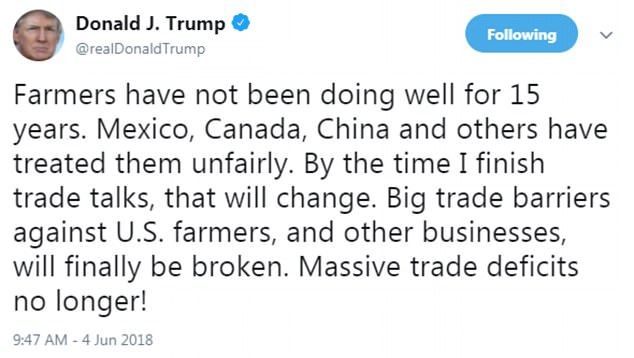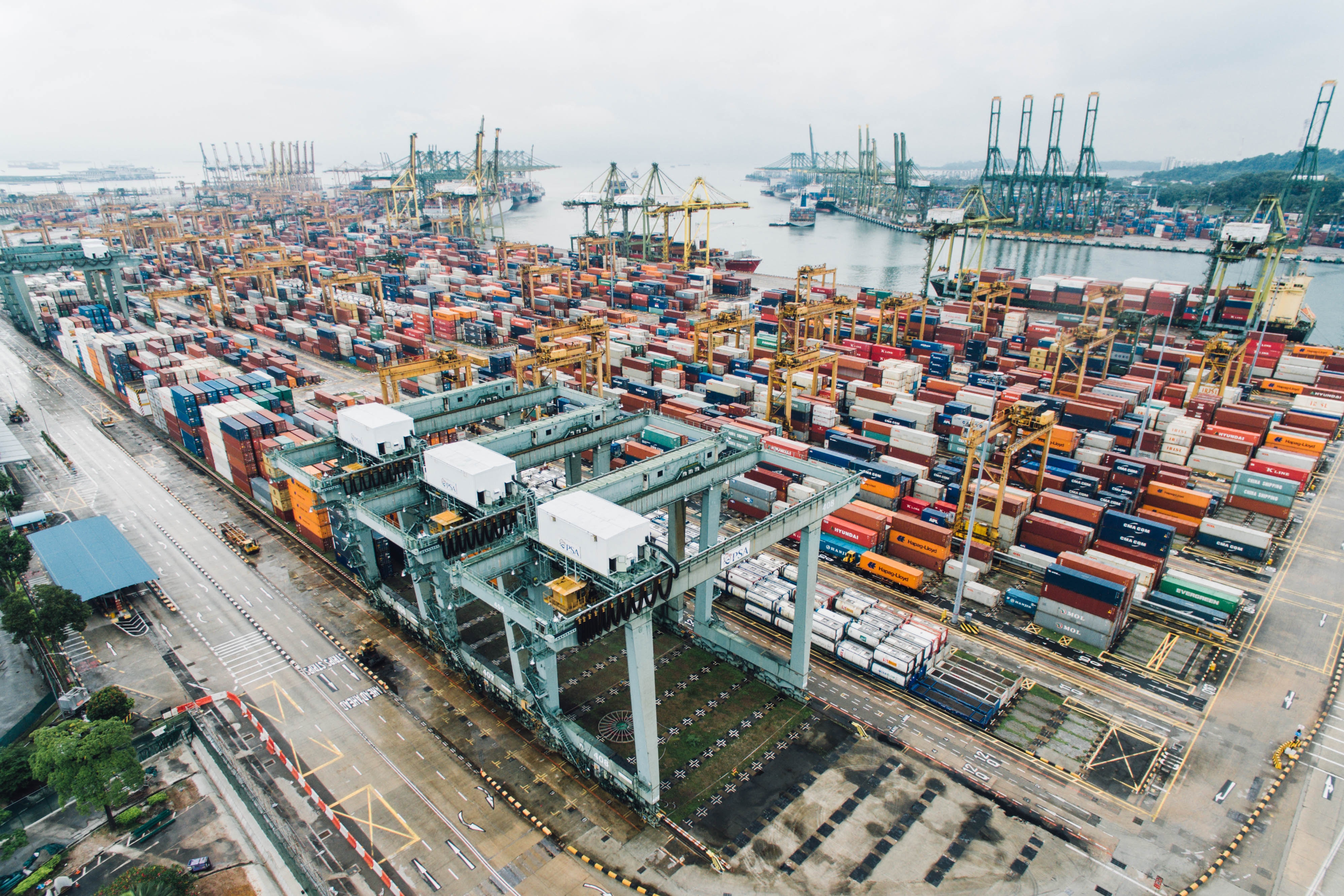Opinion – Talking trade and Trump is like the name on the outside of his buildings. A lot of show, but no real content. Now that he sits in the Oval Office, his ignorance provides more danger to the country and the world, for that matter, than just another of his bankruptcies. Can you see Trump reading up on the intricacies of international trade? I think not. Yet, it appears he refuses to listen to his chosen advisers who have actually read books….that’s not to say that they are great international trade brains either.
In a July 2, 2018 article in Alternet, I saw the following headline:
‘Trump and His Advisers Still Don’t Get It’: Paul Krugman Explains How the White House Turned the World Against the U.S.
Referring to the looming Trade War the Tweeter-in-Chief has created, Krugman kindly mentions how Trump’s team has been bungling the Trade issue. “Trump and his advisers still don’t get it, he wrote, “They remain blithely ignorant about what they’re getting into.” Peter Navarro, that magnificent WH trade czar, said he didn’t think any country would retaliate. Krugman pointed to Canada–announced retaliatory tariffs against $12.6 billion of U.S. products. The EU and China announced retaliatory tariffs. Mexico, with a new president-elect, is unlikely to be kissing the Trump ring. The EU specified that it will “go much bigger” if Trump follows through on his threat to put tariffs on European cars, potentially imposing retaliatory tariffs on almost $300 billion of U.S. exports.
Krugman: “The us is now behaving in ways that could all too easily lead to a breakdown of the whole trading system and a drastic, disruptive reduction in world trade.” My favorite comment from the article is Krugman saying that Trump is essentially having a “temper tantrum”… Demanding concessions from countries they can’t even make–because he’s invented problems that don’t exist. The United States has been using protective tariffs since its inception. We did it to protect our industries just as the British had. However, in 1980 free traders were given a nice boost (Reagan) and the nature of Trade, finance and investment began to change. The shared prosperity, while not perfect, had a basis in FDR’s New Deal policies. By 1994, with the establishment of the WTO, free trade deals exploded. Included in this morass was NAFTA.
I saw a July 6 article in Alternet. The following paragraph shows why these “Trade Deals” could use some fixing. The question is why would Trump be against them? He’s shown himself to be less than sensitive to his fellow humans. His mouth runs one way and his policies go another. Let’s take a look.
[su_quote]“Corporate power elbows in — Rather than tightly regulating the financial sector so finance, trade and investment flow toward productive investment and good jobs, these deals seek to deregulate finance and investment. They make it illegal for participating countries to enforce regulations meant to ensure productive investment, meaningful employment and social welfare.
What is more, many of these treaties allow corporations to sue governments through private tribunals that usually side with foreign firms over host country regulations on finance, public welfare and the environment.”
“Bound for failure – Trump’s tariff fixation and predisposition to renege on every trade deal his predecessors adopted won’t right these wrongs. Some of these moves may give temporary relief to workers and industries in areas long battered from bad policy. But this strategy will ultimately fail for three reasons. First, the tariffs that do improve conditions for some workers will eventually squeeze workers in other businesses – and in foreign countries. For example, higher tariffs on imported steel and aluminum will harm the automotive industry and construction, which are big employers. That was a lesson the White House should have learned from reviewing what happened when President George W. Bush experimented with similar across-the-board tariff hikes in 2002. Second, Trump’s alternatives to the trade entanglements he inherited – as seen in his NAFTA renegotiation proposals – would still tilt the rules toward big oil, gas and pharmaceutical companies over consumers, citizens and the environment. Third and most importantly, trade policies are simply tools that should help achieve broader economic goals. And so far, Trump has not given any hints that his team is hatching a parallel set of economic policies that will benefit all Americans, let alone the world Economy.
Rather than providing incentives for corporations to invest more in productivity and create more good jobs, Trump is doing his best to dismantle regulations adopted after the most recent financial crisis that were supposed to force the financial sector to act more responsibly. To pay for his tax cuts, he is aiming to slash spending on research and development and on other programs that make the country more competitive. If he really does want to make America – and the world economy – great again, I believe that Trump should look to globalization’s golden age for inspiration rather than haphazardly slapping tariffs on imports from our trading partners and expanding many of the failed policies that got him elected in the first place.”
Source: Kevin P. Gallagher, Professor of Global Development Policy; Director, Global Development Policy Center, Boston University [/su_quote]
One has to wonder if Trump’s Trade War noise has anything to do with actual Trade? The Financial Times had an interesting article: Inside the chaos of Donald Trump’s Trade Wars Steven Mnuchin, the Treasury secretary, has tried to coordinate the U.S, side in trade negotiations with China. He found himself explaining to Liu He, the Chinese vice-premier, why President Donald Trump had just reneged on a deal aimed at preventing a trade war. Basically, don’t worry that 50 billion in tariffs on Chinese goods was off. After the Memorial Day weekend, he was met with the news that Trump had resurrected the tariffs. Another administration aide blindsided by mister moody. The Trump administration is now fighting trade battles on several different fronts with both friends and rivals, leaving governments scrambling to decipher what is negotiating bluster and what is actual policy.
Even his advisers are split on how to handle this mess.
CHINA – Trump Trade and Tariffs
A long-threatened trade war between the U.S. and China has got underway after the world’s two largest economies imposed tariffs on each other. The U.S. implemented tariffs on $34bn in Chinese goods, to which Beijing responded with levies on a similar quantity of U.S. imports. “If what the U.S. wants is to escalate a trade war with China, then so be it. A little fighting may be the only way the Trump administration clears its mind and allows everyone to sober up,” the state-run Global Times said on Friday.
“The Trump administration is behaving like a gang of hoodlums with its shakedown of other countries, particularly China,” said an English-language article in the China Daily. On Thursday, a spokesperson for China’s ministry of commerce said the U.S. will be “opening fire on the whole world and also opening fire on itself.”
Analysts say tariffs are not the most effective way of putting pressure on China, which the U.S. accuses of unfair trade practices and stealing intellectual property from U.S. companies. Syracuse University economics professor Mary Lovely and researcher Yang Liang found 87% of electronics products to be levied by U.S. tariffs came from multinationals and joint ventures rather than Chinese firms. China’s economy is no longer as dependent on exports. Domestic consumption now accounts for more than half of the country’s GDP. Exports to the U.S. account for only 19% of all of China’s exports. As best I can tell EU, Chinese, and Canadian retaliation are targeted to create pain for Trump’s BASE. An intelligent use of pressure; unlike Trump’s scattershot.
Soybean Farmers from Trump Country
“The damage is already serious for American soybean farmers whose biggest customer is China. They now face a 28% tariff while competitors in Brazil and elsewhere pay no duty. The cash price for U.S. soybeans recently fell to its lowest level in about a decade,” they wrote. “Producers of beef, pork, chicken and seafood will also take a hit. U.S. automakers, which will now pay a 40% tariff after it had recently fallen to 15%, will lose sales of highly profitable SUVs that are increasingly popular with Chinese consumers.”
“Meanwhile, American consumers will pay more for cars and health care due to U.S. tariffs on Chinese-made auto parts and medical instruments,” they continued. “For example, world-leading semiconductor companies are upset that chips made in the U.S. and sent to China for assembly or testing will face a high tariff on their total value when they return. Some firms may cut China out of their supply chain, but in other cases it will make economic sense to move U.S. production overseas.”
(oops, there goes more jobs. We’ve heard that Giant Sucking Sound before)
“Anecdotal evidence is growing of tariff-related investment delays and layoffs. The U.S. Chamber of Commerce this week released state-by-state data of the damage coming from tariffs, and 17 of the 20 worst hit states voted for Mr. Trump in 2016. This isn’t the ‘winning’ those voters had in mind,” the piece pointed out. The editors then lowered the boom on Trump over his trade bungling, mocking his claim of being a great negotiator.
“The best way out of this showdown is for the two sides to call a truce and negotiate a new trade understanding. Yet neither Donald Trump nor Xi Jinping wants to look like the one standing down, so escalation is more likely than retreat,” they wrote. “As the tariff casualties mount, even many Trump voters are going to ask: When is the master negotiator actually going to negotiate a better trade deal?”
What are the costs of Mr. Trump’s tantrum?
June estimate that 400,000 jobs could be lost due to the steel and aluminum tariff. Low-skilled workers, like production workers and machine operators, are expected to be hit harder than managers and professionals and are estimated to account for about 70 percent of layoffs.
What else in new!?
The biggest industry to take a hit from these tariffs will be steel-consuming sectors, many of which are in the Rust Belt and southern states. California, Texas, and New York are also expected to suffer major losses. Also notable are job losses in agriculture, an industry that was a prime target of the retaliations set into motion by Mexico, the European Union, and Canada.

I guess that says it all…
Trump’s Trade War and Goods That Will Cost More
- Washing Machines
- Solar Panels
- Beer and Soup
- Cars
- Home Appliances
- Cell Phones
- Computers
- Toys
- Just About Everything Else
How’s them apples (as in the bargaining chip with China)?
Trump Tactics and Pearl Harbor
Trump’s recent actions of slapping our allies and kissing our enemies is destabilizing long-standing arrangements that have kept us out of world wars. If I recall, the Japanese bombed Pearl Harbor after the U.S. decided to punish their aggression by freezing Japanese assets and required onerous regulations to get oil supplies. Assistant Sec. of State Dean Acheson favored a “bullet-proof freeze” on oil shipments to Japan, claiming it would not provoke war because “no rational Japanese could believe that an attack on us could result in anything but disaster for his country.” With FDR and the boys out of town, Acheson tried some tough tactics and FDR let them ride.
Acheson, of course, was wrong. December 7, 1941 happened.
With a subservient Congress refusing to regulate Commerce with foreign nations and an executive branch that is running wild, the lack of stability is more than just a worry of higher prices.
Doug Anderson is part of the A.R. Marketing House research and writing team. His focuses include domestic and international politics, environmental sustainability, and holistic health.


